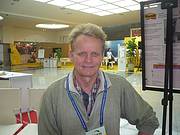Sharing local knowledge on a global stage
06 September 2012 | Article
In a small country on an even smaller mountain, it can be challenging to stay abreast of new developments in global conservation.
For Carl Bruessow, Executive Director of the Mulanje Mountain Conservation Trust (MMCT) and Chair of the IUCN National Committee of Malawi, the challenge is often much more basic, like establishing a reliable internet connection to tune in to the outside world.
Bruessow, whose family has lived in Africa for eight generations, is based in a remote area of Malawi and his work with the MMCT is locally-focused in nature.
“Our work is such that we tend to get involved in very local issues,” said Bruessow. “It’s important for us to be able to find out what the rest of the world is doing so we can learn and share.”
The MMCT takes a relatively new kind of approach to funding a conservation organization. Known as an environmental endowment trust, the MMCT is funded by the World Bank through the Global Environmental Facility (GEF) and relies on investment consultants to manage its capital. The MMCT is also a part of the Consortium of African Funds for the Environment (CAFÉ), founded in September 2011 with the mission of helping environmental funds throughout Africa.
That’s part of the reason why Bruessow is in Jeju, Korea at the 2012 IUCN World Conservation Congress. He wants to learn about new ideas, best practices and developments in conservation funding. He also wants to share his local successes with the global audience gathered at Congress.
“Traditionally, many conservation organizations spend about 75% of their time fundraising and the remaining 25 % trying to accomplish 100% percent of the work,” adds Bruessow. “We’re doing something different on a very local level and we’re here to learn and share with other regions.”



